Related Research Articles
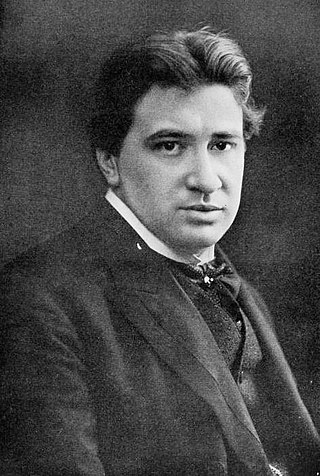
I quatro rusteghi is a comic opera in three acts, music by Ermanno Wolf-Ferrari to a libretto by Luigi Sugana and Giuseppe Pizzolato based on Carlo Goldoni's 18th-century play I rusteghi. The opera is written in Venetian dialect, hence "quatro" instead of "quattro".
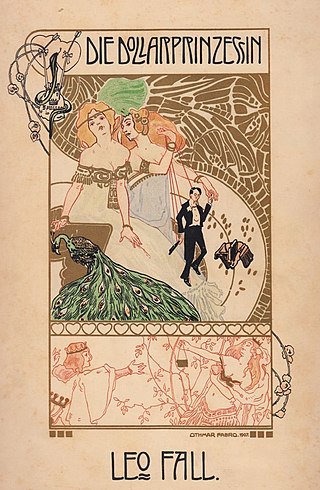
Die Dollarprinzessin is an operetta by Leo Fall. The German libretto was by Alfred Maria Willner and Fritz Grünbaum after the comedy Die Dollarprinzessinen by Emerich von Gatti and Thilo Friedrich Wilhelm von Trotha.
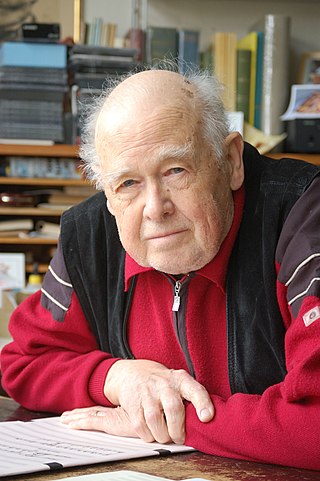
Das Märchen von der schönen Lilie, Op. 55, is an opera in two acts by Giselher Klebe, with a libretto by Lore Klebe, based on Goethe's fairy tale Das Märchen. On a commission by the SWR for the Schwetzingen Festival, it was premiered on 15 May 1969 at the Schlosstheater Schwetzingen, staged by Oscar Fritz Schuh and conducted by Hans Zender. The opera was published by Bärenreiter.

Erwin und Elmire is an opera in two acts by Duchess Anna Amalia of Brunswick-Wolfenbüttel, with a libretto by Johann Wolfgang von Goethe, after Oliver Goldsmith's ballad of Angelica and Edwin, The Hermit, in his sentimental novel The Vicar of Wakefield.
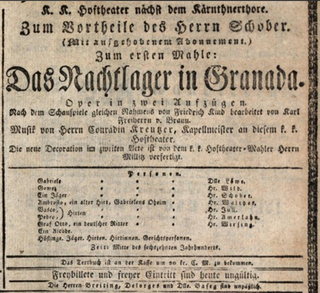
Das Nachtlager in Granada is a romantic opera in two acts by Conradin Kreutzer. The libretto is by Karl Johann Braun von Braunthal based on Johann Friedrich Kind's 1818 drama of the same name.

Zar und Zimmermann is a comic opera in three acts, music by Albert Lortzing, libretto by the composer after Georg Christian Römer's Der Bürgermeister von Saardam, oder Die zwei Peter, itself based on the French play Le Bourgmestre de Saardam, ou Les deux Pierre by Mélésville, Jean-Toussaint Merle, and Eugène Centiran de Boirie. Ultimately, it goes back to the historical Grand Embassy of Peter the Great. Gaetano Donizetti had set the same story in his 1827 opera Il borgomastro di Saardam.

Der Templer und die Jüdin is an opera in three acts by Heinrich Marschner. The German libretto by Wilhelm August Wohlbrück was based on a number of intermediate works based in turn on Walter Scott's 1819 novel Ivanhoe.

Pygmalion is a monodrama in one act by composer Georg Benda with a German libretto by Friedrich Wilhelm Gotter. The opera's first performance was at the Ekhof Theatre, the court theatre in Gotha, on 20 September 1779. Pygmalion was the fourth of the five theatrical collaborations of Benda and Gotter. Gotter based his text on Jean-Jacques Rousseau's 1762 play Pygmalion. Benda's melodrama is unusual as it has no singing roles. Two of the three characters, Pygmalion and Galatea, are spoken roles; the other, Venus, is silently acted on stage.

Die Jagd is an opera by the German composer Johann Adam Hiller. It takes the form of a Singspiel in three acts. The libretto by Christian Felix Weiße is based on the plays La partie de chasse de Henri IV by Charles Collé, The King and the Miller of Mansfield by Robert Dodsley, and the opéra comique by Michel-Jean Sedaine. The opera was first performed at the Schlosstheater, Weimar on 29 January 1770. Die Jagd is considered one of the most important early Singspiele. It was admired by Goethe and Wagner.
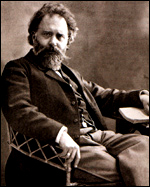
Der Evangelimann is an opera in two acts by the Austrian composer Wilhelm Kienzl. The libretto, by the composer, is based on Leopold Florian Meissner's short story "Aus den Berichten eines Polizeikommissärs". It was adapted in 1924 as a silent film The Evangelist.

Lisuart und Dariolette, oder Die Frage und die Antwort is a 'romantisch-comische Oper' by the German composer Johann Adam Hiller.
Erwin und Elmire is a singspiel, described as a Schauspiel mit Gesang, in two acts by the German composer Johann André, with a libretto by Johann Wolfgang von Goethe, after Oliver Goldsmith's ballad of Angelica and Edwin, The Hermit, in chapter 8 of his sentimental novel The Vicar of Wakefield.
Der Töpfer is a singspiel, described as a komische Oper, in one act by Johann André. The libretto was by the composer. The work was one of the first German operas to be published in full score.
The Tempest or The Enchanted Isle is an opera in three acts by composer John Christopher Smith. The work's English language libretto by David Garrick is based on the 1611 play of the same name by William Shakespeare. The opera premiered on 11 February 1756 in London at the Theatre Royal, Drury Lane.

Medea is an opera in three acts composed by Giovanni Pacini to a libretto by Benedetto Castiglia. It premiered on 28 November 1843 at the Teatro Carolino in Palermo, conducted by the composer with Geltrude Bortolotti in the title role. The libretto is based on the plays Medea by Euripides and Médée by Pierre Corneille.
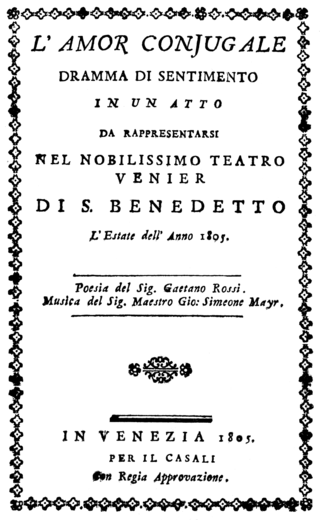
L'amor coniugale is an opera in one act by Simon Mayr set to an Italian libretto by Gaetano Rossi. It premiered at Padua's Teatro Nuovo on 26 July 1805.
La Lodoiska is an opera in three acts by Simon Mayr to an Italian libretto by Francesco Gonella De Ferrari. It was Mayr's second opera and premiered at La Fenice in Venice on 26 January 1796.
Die Geisterinsel is an opera libretto written by German poet and dramatist Friedrich Wilhelm Gotter (1746–1797), based on an earlier version by his friend Friedrich von Einsiedel. The libretto is based on Thomas Shadwell's operatic adaptation of Dryden's The Enchanted Island, which in turn is inspired by Shakespeare's The Tempest. Following Gotter's death, his widow was persuaded by Schiller to publish the late husband's libretto in his Die Horen, appearing in issues 8 and 9 of 1797.
Il trionfo di Clelia, Wq. 31, is an opera composed by Christoph Willibald Gluck. It takes the form of a dramma per musica in three acts. The Italian-language libretto by Pietro Metastasio is based on several semi-legendary narratives concerning the founding of the Roman Republic. The opera premiered on 14 May 1763 at the Teatro Comunale di Bologna. Although rarely performed since then, it was revived in London in 2012 at the Royal Opera House's Linbury Studio.
References
- ↑ Casaglia, Gherardo (2005). "Die Geisterinsel, 19 May 1798" . L'Almanacco di Gherardo Casaglia (in Italian).
- ↑
- John Warrack (2001). German Opera: From the Beginnings to Wagner. Cambridge Univerity Press. p. 183. ISBN 9780521235327.
- Casaglia, Gherardo (2005)."Die Geisterinsel, 6 July 1798". L'Almanacco di Gherardo Casaglia (in Italian).
- ↑ Francien Markx (2015). E. T. A. Hoffmann, Cosmopolitanism, and the Struggle for German Opera. Brill. p. 61. ISBN 9789004309579.
